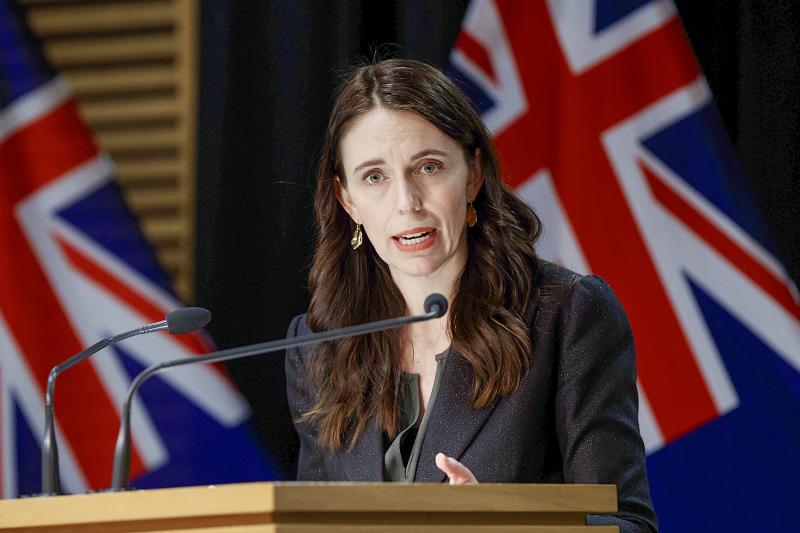New Zealand yesterday set itself an ambitious new emissions reduction target, with a pledge to halve its net greenhouse gas emissions by 2030.
The new target, announced as world leaders gather in Glasgow, Scotland, for the critical COP26 summit on climate change, is substantially higher than the previous goal of a 30 percent reduction set as part of the 2015 Paris agreement.
New Zealand’s enhanced contribution to the global fight on climate change “represents our fair share, and is in line with what’s needed if we are to avoid the worst impacts of global warming,” New Zealand Prime Minister Jacinda Ardern said.

Photo: AP
Emissions are about the same as they were in 2005 and New Zealand Minister of Climate Change James Shaw described the next decade as “make or break” for the planet.
“To stand a chance of limiting global warming to 1.5°C, the science shows we now have about eight years left to almost halve global greenhouse gas emissions,” he said in a statement. “That’s eight years for countries to make the necessary plans, put in place policies, implement them, and ultimately deliver the cuts.”
Under a complex system for determining the contribution to fighting climate change, the cuts will include arrangements helping other countries reduce their emissions, drawing criticism from the opposition National Party.
“National supports using global carbon markets to achieve our targets, but there is no sense in setting a target that over-reaches and simply signs New Zealand up to a huge bill as we buy units from overseas,” the party’s climate change spokesman Stuart Smith said.

‘TERRORIST ATTACK’: The convoy of Brigadier General Hamdi Shukri resulted in the ‘martyrdom of five of our armed forces,’ the Presidential Leadership Council said A blast targeting the convoy of a Saudi Arabian-backed armed group killed five in Yemen’s southern city of Aden and injured the commander of the government-allied unit, officials said on Wednesday. “The treacherous terrorist attack targeting the convoy of Brigadier General Hamdi Shukri, commander of the Second Giants Brigade, resulted in the martyrdom of five of our armed forces heroes and the injury of three others,” Yemen’s Saudi Arabia-backed Presidential Leadership Council said in a statement published by Yemeni news agency Saba. A security source told reporters that a car bomb on the side of the road in the Ja’awla area in

PRECARIOUS RELATIONS: Commentators in Saudi Arabia accuse the UAE of growing too bold, backing forces at odds with Saudi interests in various conflicts A Saudi Arabian media campaign targeting the United Arab Emirates (UAE) has deepened the Gulf’s worst row in years, stoking fears of a damaging fall-out in the financial heart of the Middle East. Fiery accusations of rights abuses and betrayal have circulated for weeks in state-run and social media after a brief conflict in Yemen, where Saudi airstrikes quelled an offensive by UAE-backed separatists. The United Arab Emirates is “investing in chaos and supporting secessionists” from Libya to Yemen and the Horn of Africa, Saudi Arabia’s al-Ekhbariya TV charged in a report this week. Such invective has been unheard of

US President Donald Trump on Saturday warned Canada that if it concludes a trade deal with China, he would impose a 100 percent tariff on all goods coming over the border. Relations between the US and its northern neighbor have been rocky since Trump returned to the White House a year ago, with spats over trade and Canadian Prime Minister Mark Carney decrying a “rupture” in the US-led global order. During a visit to Beijing earlier this month, Carney hailed a “new strategic partnership” with China that resulted in a “preliminary, but landmark trade agreement” to reduce tariffs — but

SCAM CLAMPDOWN: About 130 South Korean scam suspects have been sent home since October last year, and 60 more are still waiting for repatriation Dozens of South Koreans allegedly involved in online scams in Cambodia were yesterday returned to South Korea to face investigations in what was the largest group repatriation of Korean criminal suspects from abroad. The 73 South Korean suspects allegedly scammed fellow Koreans out of 48.6 billion won (US$33 million), South Korea said. Upon arrival in South Korea’s Incheon International Airport aboard a chartered plane, the suspects — 65 men and eight women — were sent to police stations. Local TV footage showed the suspects, in handcuffs and wearing masks, being escorted by police officers and boarding buses. They were among about 260 South